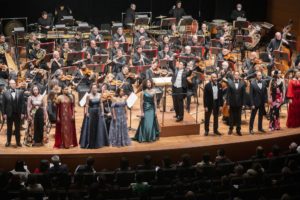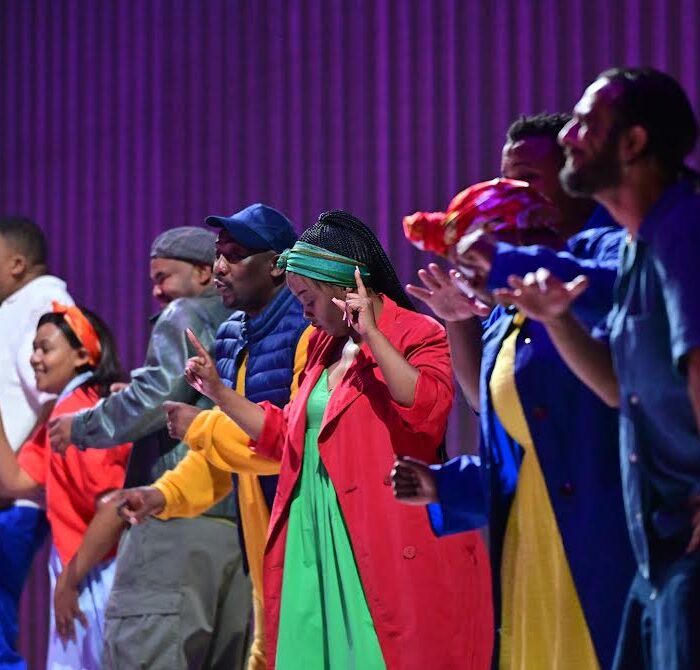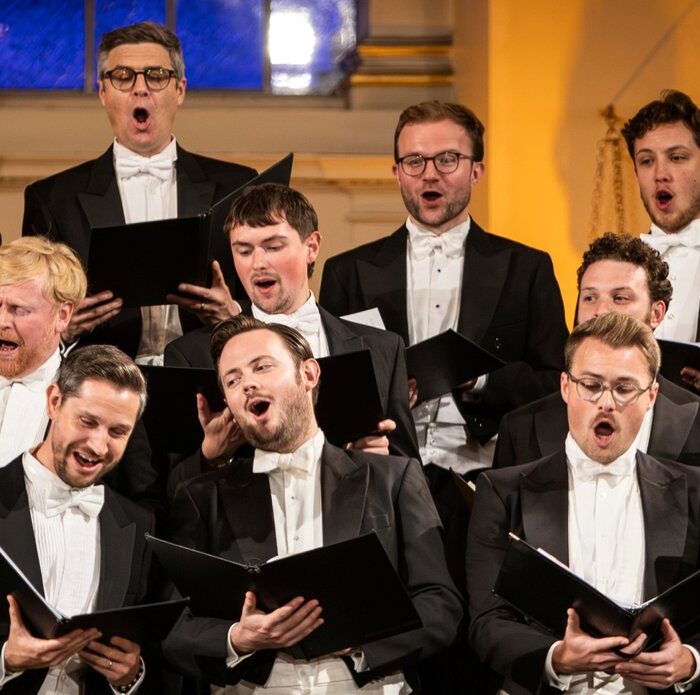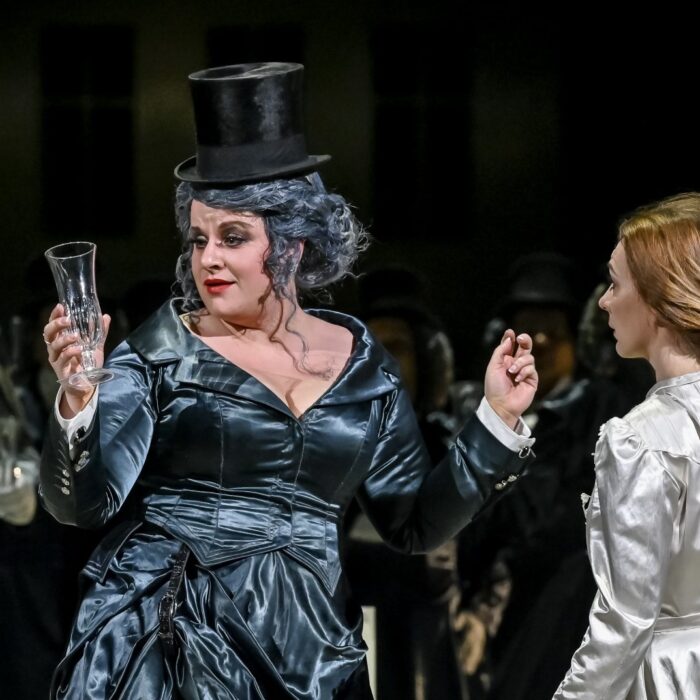
Alice Tully Hall 2023 Review: iSing! Suzhou’s ‘Echoes of Ancient Tang Poems’
By David SalazarOn Jan. 7, 2023, iSing Suzhou, in collaboration with the Philadelphia Orchestra and the Asian Performing Arts Council presented “Echoes of Ancient Tang Poems” at Alice Tully Hall.
The event, in celebration of the Lunar New Year, was the culmination of a compositional competition that initiated in 2020. The composition yielded competitions from around the world, and the winners got their North American premiere as part of this concert, which was also a commemoration of the Philadelphia Orchestra’s 1973 tour of China. To add to the East meets West collaboration, the competition compiled a series of vocal soloists from such countries as Ukraine, the USA, Mexico, Nicaragua, Canada, Serbia, Latvia, China, the Dominican Republic, and Italy, all under the musical direction of Lio Kuokman.
The 90-minute program kicked off with the propulsive Spring Festival Overture by Li Huanzhi before launching into a special commission entitled “Drink to Me” by Chinese composer Maishuo Luo interpreting a poem by Li Bai. Opening with spoken lines, the choral piece built into an epic wave of sound that had the audience amped up for the rest of the evening.
Bass Wei Wu then took to the stage to interpret Australian composer Sam Wu’s rendition of Li Bais’ poem “Quiet Thoughts by Night.” In one of the most memorable vocal displays of the night, Wu’s potent voice delivered a mournful and angered interpretation, constantly delivering sobbing or aggressive accents on reminders of “home.”
Following another large ensemble for Liu Yuxi’s poem “Bamboo Shoots” by Spanish composer Tomàs Peire-Serrate that spotlighted soprano Juliet Petrus as the soloist, audiences got to hear Latvian baritone Valdis Jensons showcase his powerful bass for Chinese composer Xiao Su’s setting of Bai Juyi’s “Farewell on the Prairie.”
Serbian soprano Milica Jovcic then showcased her fluid legato singing in Spanish composer Fernando Buide del Real’s interpretation of Wang Bo’s “Sending Off Du Shaofu.” Baritone José Rubio then delivered an aggressive take on South African composer Conrad Asman’s composition of Wang Han’s “Drinking Song,” which centers on a soldier getting ready for war.
That was followed by a duet featuring soprano Raquel Suarez Groen and tenor Kyle Tomlin as they performed Chinese composer Cong Wei’s setting for Gao Shi’s “Farewell to Dong Da.”
Then came arguably the most operatic of pieces in the form of American composer Nicholas Bentz’s interpretation of Yang Jiong’s Enlisting. Written for two baritones and a bass, the piece’s thick orchestral and forward drive not only created a powerful visualization of the drive toward war, but featured exquisite vocal writing in which Wei Wu, Valdis Jansons, and Ukrainian baritone Ihor Mostovoi were able to show off their vocal potency. After each gets a line of the poem, the three come together for an impressive trio that only builds the tension up to the composition’s furious ending.
Following this piece came Evan Mack’s composition based on Du Fu’s “News of Victory.” This war song is a duet for baritone and soprano and once again featured Ukrainian baritone Ihor Mostovoi alongside Nicaraguan soprano Deborah Solange Martinez. Also operatic in design, the piece features some forte declamations from the baritone line set against a similarly potent orchestration. But before long as the poem reflects domestic images and dreams, the piece softens, Mostovoi’s vocalization receded to piano singing and Martinez emerged amidst the musical tapestry. From there, the piece transforms into a full-blown duet, the music swelling toward a hyper-romantic climax.
Those two intense works were then followed by a major shift in tone in the form of Chinese composer Nono Tongyan Chen’s “Singing of a Goose and Song of Snow” (poem by Luo Binwang and Zhang Dayou). This bouncy little tune featured an ensemble of female vocal artists with soprano Holly Flack, known for her extreme high notes (she reportedly sang a high B above C6), getting a chance to showcase those very high extremes of her range.
That piece then transitioned into one of the standout compositions of the night – American composer Cynthia Lee Wong’s tranquil setting for Liu Zongyuan’s “Snow on the River.” Featuring a stripped-down orchestration that at times showcased a solo violin and solo cello, this tone poem created a meditative moment that was furthered by the delicate singing of soprano Esther Maureen Kelly. Instead of a build toward a climactic high note, as was the case with numerous compositions (and most vocal compositions with orchestra at large), this one focused more on sustaining the trance-like mood through expansive legato lines.
Baritone José Rubio returned to the stage for “Up on the Crane Tower” by American Composer Evan Mack (poem by Wang Zhihuan). Rubio’s vocal line kicked off with some intense forte singing, before slowly diminuendoing over the course of the piece, ending on a delicate piano line.
Chinese composer Jiao Zhang’s rendition of Du Mu’s “To the Assistant Magistrate of Han Chuo” was a composition for two tenors, performed by Thomas Glenn and Kyle Tomlin. The piece was a sensorial onslaught that gave prominence to the percussion section that was among the orchestra’s most fascinating interpretations on the night. The writing for tenor was interesting, with Tomlin asked to constantly sing in a very high tessitura amidst the thick orchestration.
Next came two presentations of Zhang Ji’s poem “Docking by Bridge at Night.” It was first presented in pingtan style (a capella) by Esther Maureen Kelly. The soprano delivered the vocal rendition with tremendous vocal clarity and brightness, a massive musical contrast to her work “Snow on the River,” all while walking from one side of the stage to the other. The audience broke into applause as she finished her performance.
That led to the second iteration of the poem, this time set to music by Chinese composer Leishuo Ye. Mexican soprano Paula Malagón delivered a glorious rendition, performing with rich sound and smooth legato lines throughout.
The “finale” of the program was Yellow Crane Tower, a poem by Cui Hao, set to music by Canadian composer Roydon Hoi Chak Tse. Featuring the entire ensemble, the piece struck a more gentle chord that seemed like a surprising end to the concert.
But of course, that wasn’t the end. Two encores followed including a famed romance as well as “Jasmine to Turandot” featuring melodies that opera audiences would recognize from the famed Puccini opera.
The audience couldn’t get enough of it, applauding the performers throughout the evening following Mandarin declamations and even clapping along during one of the encores.
At the podium, Kuokman was very attentive to the performers throughout the night, constantly adjusting the balance whenever the orchestra pushed its sound in the unforgiving Alice Tully Hall.


